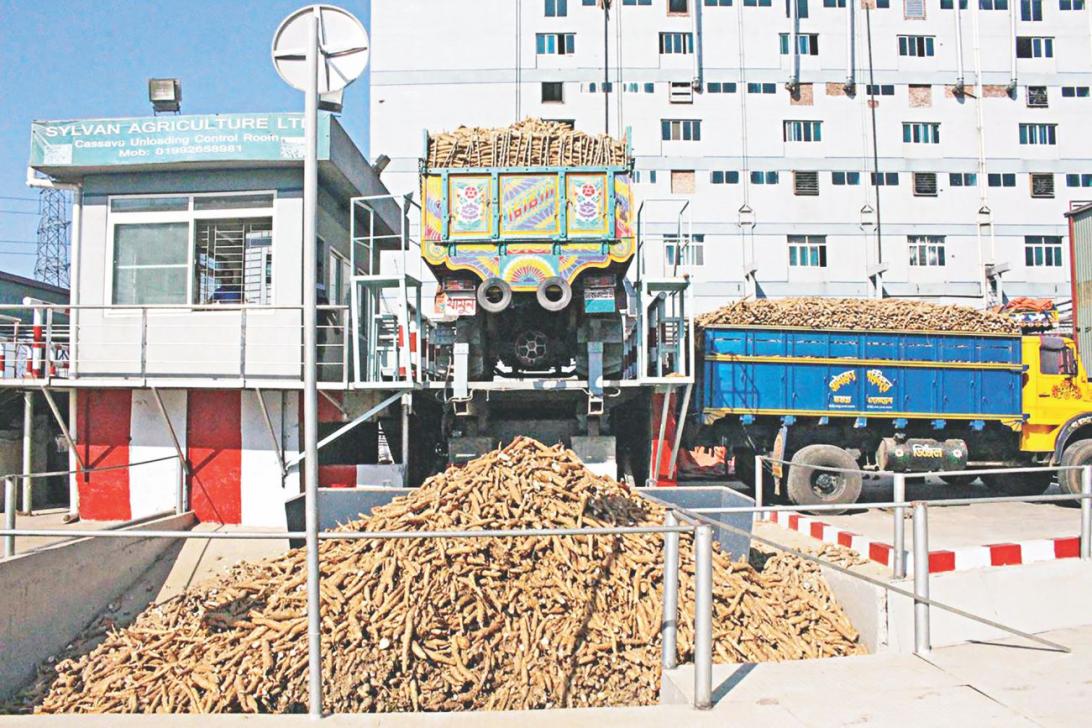Cassava yield rises yet full potential untapped

Annual production of cassava, a root vegetable similar in looks to sweet potato and commonly eaten across Africa, is estimated to have doubled in Bangladesh, thanks to growing demand for its starch from the industrial sector.
Yet locals can meet just 2 percent of the demand at home, prompting garment, pharmaceutical and food processing industries to import the rest from Thailand, India and Vietnam.
Cassava takes around a year to grow on being planted between November and March and the variety available in Bangladesh can be harvested once.
Food processor Pran estimates that 30,000 tonnes of Cassava were grown on 6,000 acres of land in 2018 whereas in 2017 some 14,000 tonnes were harvested from 3,700 acres.
However, extracting just one kilogramme of starch can require some four kilogrammes of cassava.
While the industries seek around 3.50 lakh tonnes of starch, local growers can garner only 5,000 to 6,000 tonnes, said Mahatab Uddin, chief operating officer of Pran Agro Business.
Meanwhile, industrial demand for cassava starch is growing by 10 to 15 percent every year, he pointed out.
The solution, according to cultivators and sector insiders, lies in expanding its farming while using high-yield varieties.
Uddin said cassava's sole weakness was waterlogging. Flash floods and excessive rains dented 2017's harvest as 2016's yield was around 1,000 tonnes more, but required 700 acres of less land, he said.
Agriculture graduate Rajib Kumar Roy echoed Uddin, saying two to three days' waterlogging would do the damage, for which hilly or partially-hilly areas were the land of choice.
Roy too was interested in expanding his farm, for he hopes to make a profit of Tk 5 lakh from a 200-tonne harvest cultivating some 60 acres of land in Srimangal upazila.
There is no need for extra efforts demanded by paddy and other crops, except that fertiliser has to be used, he said, adding that it was very easy and cheap and anyone could cultivate it without any prior training.
Liton Datta, another farmer who cultivated cassava on 200 acres of land at Rongirkul village in Moulvibazar's Kulaura upazila, expects to make a profit of roughly Tk 20 lakh from his harvest which he believes would amount to 1,400 tonnes.
According to him, every acre of land requires Tk 25,000 to Tk 35,000 and yields at least 6 tonnes of cassava.
There are varieties of the crop which can be harvested twice a year and can raise per acre output to 14-15 tonnes, Datta said.
Masuk Mia, a grocer, cultivated cassava on 350 acres of land in Bijoynagar of Brahmanbaria and Kanighat of Sylhet under a contract with Pran.
Pran says it provides farmers Tk 17,000 per acre in advance for cassava farming before it purchases each kilogramme for Tk 7.5.
He said a profit of at least Tk 10,000 can be made from an acre with minimum invest and labour.
He accused the Department of Agricultural Extension of not cooperating with farmers and not giving clues on how to improve the quality of the harvest.
Talking to The Daily Star, Bimal Chandra Kundo, principal scientific officer of the Bangladesh Agriculture Research Institute (BARI), said they did not have enough scientists to research and develop high-yield cassava.
He acknowledged that it fell upon the BARI to develop a hybrid variety as had experts in the Philippines and India had done.
Kundo pointed out that collection of hybrid seeds from any country requires permission from the agriculture ministry's seed wing and certification from the source country.
The BARI plans to develop a high-yield variety through research on collecting seeds from India's Tamil Nadu, where the cultivation was widespread, he said.
“We need to develop the crop in Bangladesh as the economic benefit is there through the multidimensional use in the industrial sector,” he said.
